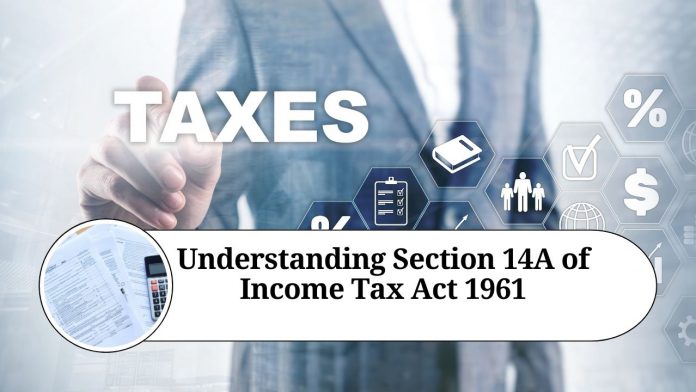The Income Tax Act, 1961 is an essential legislation that governs the taxation of income in India. Among its many provisions, Section 14A is a crucial aspect that taxpayers need to be aware of. This section deals with the disallowance of expenditure incurred by taxpayers for earning income that is exempt from tax. In this blog, we will explore the implications of Section 14A and the compliance requirements for taxpayers.
Understanding Section 14A
The objective of Section 14A is to prevent taxpayers from claiming tax deductions on expenses incurred for earning income that is exempt from tax. For example, if a taxpayer invests in tax-free bonds and incurs expenses in managing those investments, Section 14A disallows the deduction of those expenses from taxable income. This provision ensures that taxpayers do not get a tax benefit on income that is not subject to taxation.
Implications of Section 14A
Section 14A has significant implications for taxpayers, especially those who earn exempt income. If a taxpayer fails to comply with the provisions of Section 14A, the tax authorities can initiate penalties and interest charges. The disallowance of expenses under Section 14A can result in higher tax liability for taxpayers. Therefore, it is essential for taxpayers to understand the provisions of this section and comply with them to avoid penalties and additional tax liabilities.
Compliance Requirements
Taxpayers must comply with the following requirements to ensure compliance with Section 14A:
- Maintain Proper Books of Accounts: Taxpayers must maintain accurate and comprehensive books of accounts that clearly show the expenses incurred for earning taxable income and the expenses incurred for earning exempt income.
- Determine Exempt Income: Taxpayers must determine the amount of exempt income earned during the financial year. They must also identify the expenses incurred for earning that income.
- Calculate Disallowance: Taxpayers must calculate the disallowance of expenses incurred for earning exempt income. The disallowance is calculated based on the proportion of exempt income to total income.
- Disclose Disallowance in Tax Return: Taxpayers must disclose the disallowance of expenses incurred for earning exempt income in their tax returns.
In conclusion
Section 14A of the Income Tax Act, 1961 is a crucial provision that taxpayers must comply with. Failure to comply with the provisions of this section can result in penalties and additional tax liabilities. Taxpayers must maintain accurate books of accounts, determine the amount of exempt income earned, calculate the disallowance of expenses incurred for earning exempt income, and disclose the disallowance in their tax returns. By complying with the provisions of Section 14A, taxpayers can ensure that they do not face any penalties or additional tax liabilities.
Read more useful content:
- section 145 of income tax act
- section 10e of income tax act
- section 9 of the income tax act
- section 94b of income tax act
- section 206aa of income tax act
Frequently Asked Questions (FAQs)
Q: What is Section 14A of the Income Tax Act, 1961?
A: Section 14A deals with the disallowance of expenditure incurred by taxpayers for earning income that is exempt from tax.
Q: What is the objective of Section 14A?
A: The objective of Section 14A is to prevent taxpayers from claiming tax deductions on expenses incurred for earning income that is exempt from tax.
Q: Which expenses are disallowed under Section 14A?
A: Expenses incurred for earning exempt income are disallowed under Section 14A.
Q: What is exempt income?
A: Exempt income is income that is not subject to tax. Examples of exempt income include dividends received from Indian companies, long-term capital gains on equity shares, and interest earned on tax-free bonds.
Q: How is the disallowance of expenses under Section 14A calculated?
A: The disallowance of expenses is calculated based on the proportion of exempt income to total income. The formula for calculating the disallowance is as follows: Expenditure incurred to earn exempt income x Exempt Income/Total Income.
Q: Do taxpayers need to maintain separate books of accounts for exempt income?
A: Taxpayers are not required to maintain separate books of accounts for exempt income. However, they must maintain accurate and comprehensive books of accounts that clearly show the expenses incurred for earning taxable income and the expenses incurred for earning exempt income.
Q: Is there a penalty for non-compliance with Section 14A?
A: Yes, there is a penalty for non-compliance with Section 14A. If a taxpayer fails to comply with the provisions of this section, the tax authorities can initiate penalties and interest charges.
Q: How do taxpayers disclose the disallowance of expenses under Section 14A in their tax returns?
A: Taxpayers must disclose the disallowance of expenses incurred for earning exempt income in their tax returns. This information can be provided in the tax return form under the appropriate section.
Q: Is Section 14A applicable to all taxpayers?
A: Yes, Section 14A is applicable to all taxpayers, including individuals, companies, and firms.




















